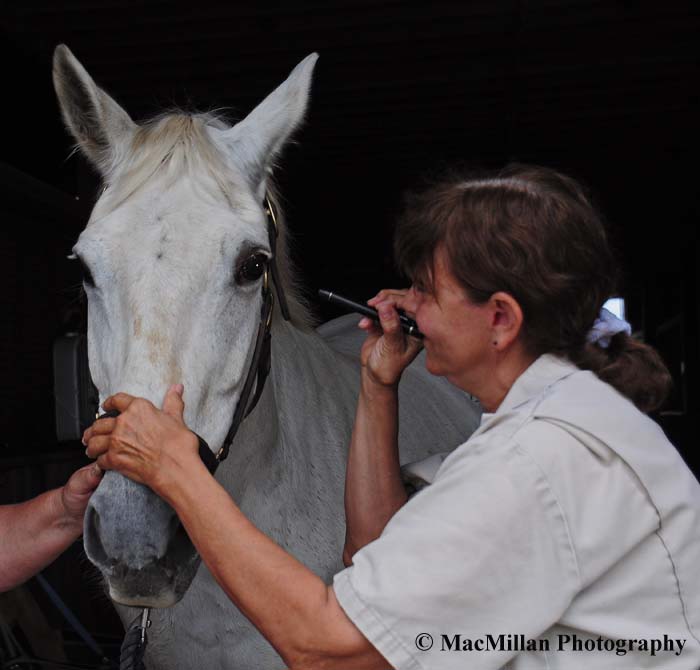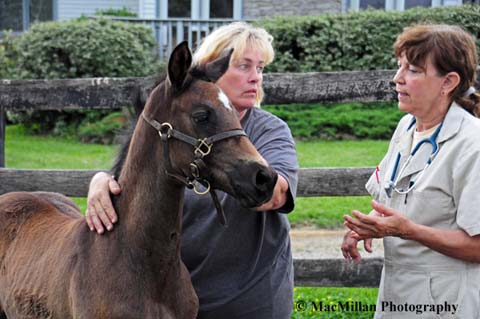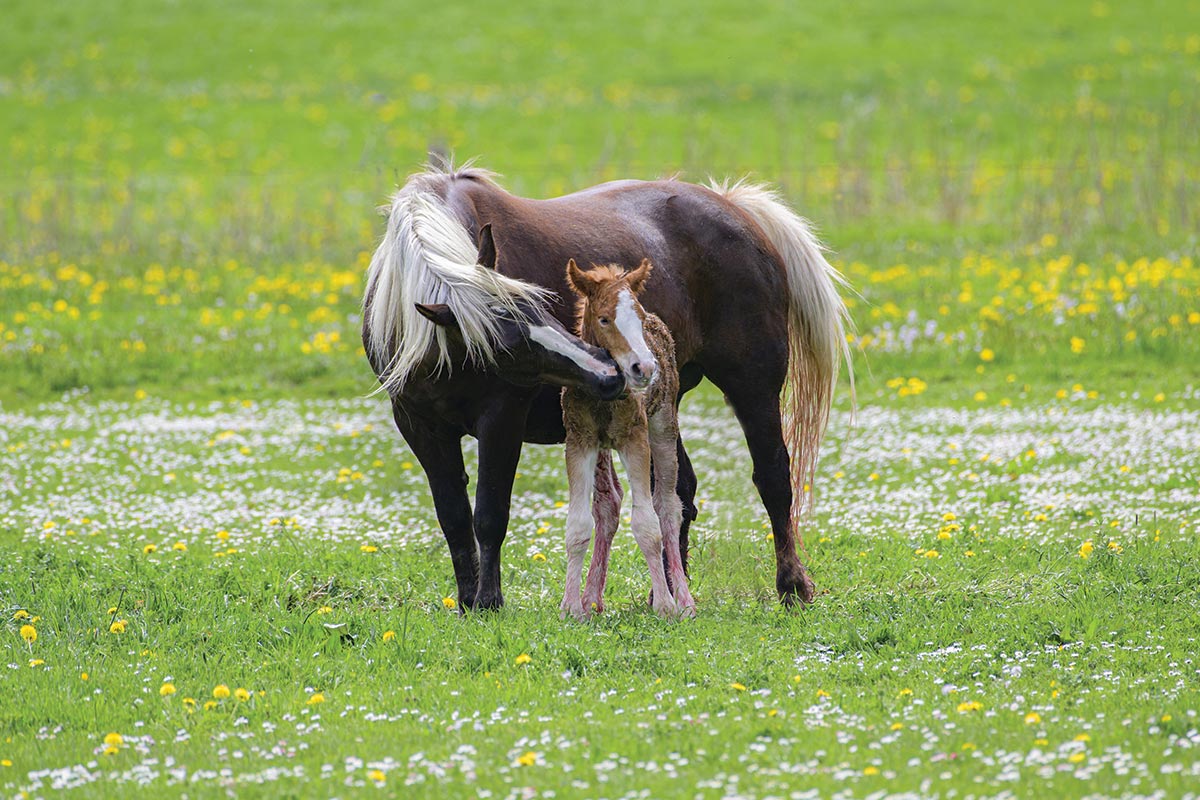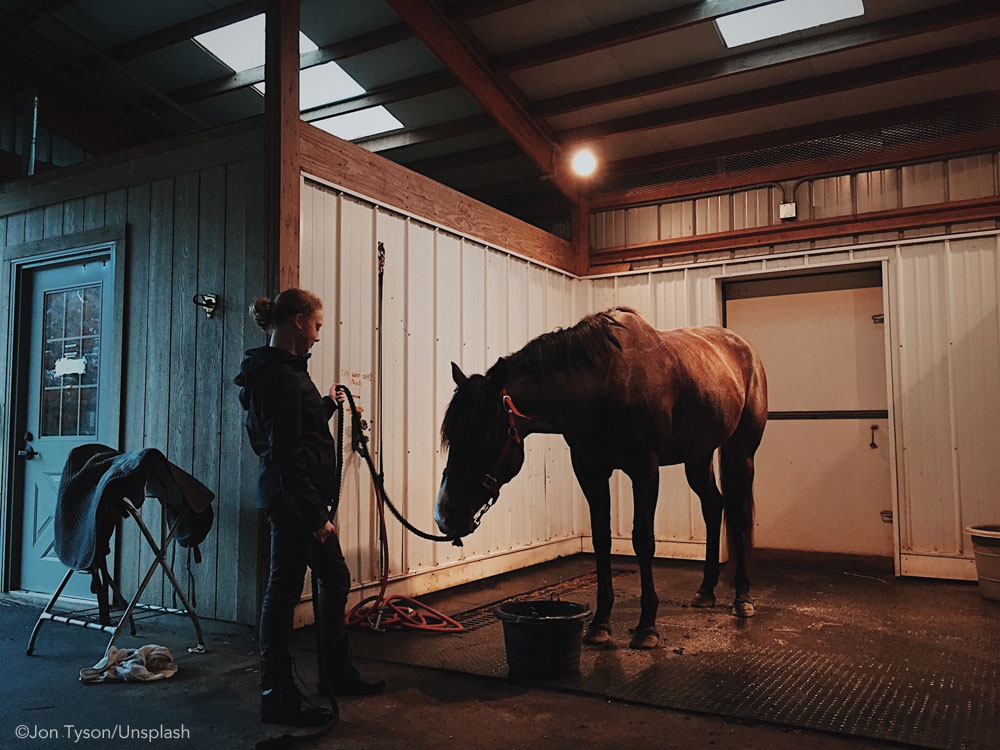The relationship with your equine veterinarian should rank right up there with the all-important one you have with your horse. It’s something that each of us as horse owners should nurture in order to keep our horses healthy and happy and to keep our lives and our veterinarians’ lives lower in stress. Spring vaccinations, Coggins testing and dental exams are on the horizon as we get ready for show and trail riding season, so here are eight tips to help you be well prepared when the vet arrives at your barn for a routine visit.

Teaching your horse to stand well for an eye examination with a pen light will earn appreciation from your veterinarian. Photo by Kim MacMillan/MacMillan Photography
Dr. Diane Ganzer, who has an equine practice near Lexington, Kentucky, shared her time and thoughts to help plan for a productive health check for your horse.
“I really appreciate a client who is well prepared, because it helps me to keep on schedule,” says Dr. Ganzer. “It also provides an element of safety for the veterinarian and the other people connected with the situation. In general, it allows me to provide the best care for my client’s horses.”
1. Making the Appointment
Start looking at your calendar way ahead of when you would like the veterinarian to be at your farm and have several options in mind so that you can be flexible. Realize that you are not the only client of their practice who will be scheduling an appointment during their busy times of year. Adopt an “ask, don’t demand” tone when speaking with the vet’s receptionist as you schedule your appointment. When you make the appointment make sure to outline all that you have planned for their visit; explain how many horses are to be seen and how many procedures (vaccinations, teeth floating, blood pulls for Coggins tests, physical examinations, etc.) you have on your list. This helps the staff at the veterinary clinic to block enough time for your vet’s visit. Once the appointment is made, mark it on your personal calendar and your barn calendar so you don’t forget.
2. Consider Doing Practice Exams
If your horse is not a happy camper about veterinary procedures, or if you have a young horse or a horse that is new to you, practice with him for several days, or even months, ahead of time. Repeat and reward for good behavior during tasks like: picking up feet; rubbing his neck where vaccinations will be administered and the chest and barrel where a stethoscope will listen to heart, lungs and gut sounds; picking up his tail like your vet will do when taking his temperature; standing while a weight tape is put around his barrel; opening his mouth, and standing quietly while a flashlight is shined in his eyes. Consider bringing in a knowledgeable friend who is new to your horse and have that person give your horse treats and move around the horse patting him and pretending to examine him as a veterinarian would.
3. Groom Your Horse Before the Vet Arrives
Brush your horse and pick out his/her feet so that time doesn’t have to be wasted doing this while the vet is there. If your horse’s coat and feet are clean it will be much easier for the veterinarian to do a thorough physical exam and there may be a lesser chance of injection site reactions too. If your vet is coming out to examine a wound, ask ahead of time how to clean it properly so that it is ready for examination when your vet arrives.
4. Be Ready On the Day
Be prepared ahead of time so to that you don’t have to rush as your vet pulls up. This reduces stress for you and your horse and really helps your veterinarian stay on schedule for the day.
At least half an hour, or maybe more, before your vet’s scheduled time of arrival make sure that your horse is in a stall or small pen, where he can be caught easily and handled safely. Have a halter and lead rope at the ready (it is a good idea to have both a regular lead rope and a lead with a chain to choose from as well as a twitch if you own one). Have your barn aisle or small pen clear of obstructions that could harm horse or humans if the horse moves quickly during the exam or when you are leading the horse for something such as a lameness evaluation.
5. Have Helpers and Equipment Ready
It never hurts to have an extra pair of capable, strong hands available during your veterinarian’s visit. Your helper could be asked to do things like holding extra equipment or to help restrain the horse (if your veterinarian requests assistance) or fetch things like a bucket of water or a bale of straw to set an ultrasound machine on for instance.

Diane Ganzer, D.V.M. discusses a health plan for a foal with Linda Miggelbrink at Mae Jean Fichter’s Mae’s Way Farm in Lexington, Kentucky. Photo by Kim MacMillan/MacMillan Photography
It’s also a good idea to have these things nearby and easy to grab, but not in the immediate vicinity of where the horse is standing: an extra halter and lead rope in case something breaks; baling twine; a twitch; pen and paper; a clock or watch; soap and water; paper towels; a trash can; a clean bucket; straw or shavings bales; heavy duty extension cord; an extra light source such as a spot light, clamp light or flashlight, and a muck bucket and shovel.
6. Inform Your Veterinarian of Any Behavioral Issues That Your Horse Has
We all love our horses and often think that they can do no wrong, but before your veterinarian starts the exam, be honest and informative about any behavioral issues you horse has regarding being handled, vaccinated, twitched, and so on. That way your veterinarian can plan how he/she approaches and restrains your horse, so the procedures are safer for everyone involved.
7. Have Your Horse’s Veterinary Records Available
Especially if your horse is new to your veterinarian, but even if they are established patients, make sure to have vaccination, farrier, dewormings and teeth check dates, medical history and a medication and supplement list at the ready when your vet arrives. You should also remind your veterinarian about any allergies or reactions your horse has displayed in the past to medicines or vaccinations.
Discussing your horse’s feeding schedule, including amounts and types of grain and hay fed, might also be pertinent. Your veterinarian will appreciate the memory refresher since they see many clients in a day. If your vet has this information there will be no need to administer unnecessary vaccinations or perform other routine procedures if they have already been done recently, which will save time and money. Taking a few minutes to go over your horse’s records with your veterinarian offers a great opportunity for you to ask questions and take notes too.
8. Be Thankful!
“Thank you” doesn’t cost you anything and everyone appreciates being treated with respect and knowing that their efforts are appreciated, so please remember to thank your veterinarian as they leave. Also make sure that you know your veterinary clinic’s payment procedures; some may want payment arrangements made beforehand, or at the time of service, while others may need your billing information in order to send you an invoice. For routine procedures you should be able to get a cost estimate at the time you schedule the appointment. Your vet has probably already had a long day by the time he or she sees you, so the offer of a cold or hot beverage as they finish up might also be really appreciated.
Source material for this article was found on the American Association of Equine Practitioners (AAEP) website at and the Blue Ridge Veterinary Services website.
Liked this article? Here are others you’ll enjoy:
About Dr. Diane L. Ganzer: A graduate of the University of Illinois Veterinary School in 1998, Dr. Ganzer has been a practicing equine veterinarian in the Lexington, Kentucky, area for 16 years. Her practice is based in Paris, Kentucky, located just north of Lexington. She specializes in general horse care with some reproduction work. Though she has worked on many race and performance horses in her career, she says she really enjoys working with backyard horse owners because they are very sincere and really love their horses. “I connect with that because that is what I was before I became a veterinarian,” says Ganzer. Dr. Ganzer’s listing on the Kentucky Veterinary Medical Association website can be found at kvma.org.
Kim MacMillan has been a journalist and photographer for over 35 years. She graduated from Purdue University with degrees in agriculture journalism and animal science. She and her husband Allen, who is also a sports photographer, raise sport horses and ponies on their 84-acre farm in Northeastern Indiana. The MacMillan’s travels for photojournalism work take them all over the world with recent trips to Canada, France, Germany and Mexico.






Good Simple advice, but stuff we can forget when we are in a hurry or worried by about an injury.
i work with a vet and these are all very helpful things to prepare!
Great tips especially the last one. However, I never call my vet except for emergencies. Not exactly easy to plan those!
I never can afford a vet, unless it is a emergencies. Our club does hold clinics for coggins shots, but then it is only for that.
Great piece Diane Its great to see that you doing well and helping people and their horses. Your a amazing person.